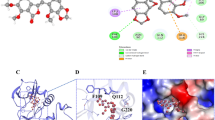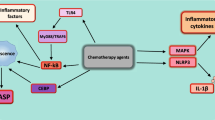Abstract
Non-small cell lung carcinoma (NSCLC), a malignancy of lungs, is very aggressive and usually ends up with a dismal prognosis. Cisplatin (CDDP)-based systemic chemotherapy is the main pharmaceutical approach for treating NSCLC, but its effect is discounted by some hitherto unknown reasons. Thus, this study is dedicated to improving the efficacy of CDDP. Our results show that combining use of CDDP with CK2 siRNA or inhibitor is more efficient in suppressing cancer cell growth and promoting apoptosis than use of CDDP alone. The underlying mechanism is that CDDP has two pathways to go: one is that it directly induces apoptosis and the other is that it activates CK2, which suppresses proapoptosis gene promyelocytic leukemia (PML). In conclusion, inhibiting CK2 can enhance sensitivity of CDDP to NSCLC cancer cells through PML.










Similar content being viewed by others
References
Scaglioni PP, Yung TM, Cai LF, Erdjument-Bromage H, Kaufman AJ, Singh B, Teruya-Feldstein J et al (2006) A CK2-dependent mechanism for degradation of the PML tumor suppressor. Cell 26:269–283
Dholaria B, Hammond W, Shreders A, Lou Y (2016) Emerging therapeutic agents for lung cancer. J Hematol Oncol 9:138
Wang WW, Wang SJ, Zhou ZR (2016) Did dose escalated radiotherapy in stage III non-small cell lung cancer improve overall survival? J Thorac Dis 8:3338–3342
Siegel R, Naishadham D, Jemal A (2013) Cancer statistics, 2013. CA Cancer J Clin 63:11–30
Dela Cruz CS, Tanoue LT, Matthay RA (2011) Lung cancer: epidemiology, etiology, and prevention. Clin Chest Med 32:605–644
Powell CA, Halmos B, Nana-Sinkam SP (2013) Update in lung cancer and mesothelioma 2012. Am J Respir Crit Care Med 188:157–166
Stahel R, Peters S, Baas P, Brambilla E, Cappuzzo F, De Ruysscher D, Eberhardt WE et al (2013) Strategies for improving outcomes in NSCLC: a look to the future. Lung Cancer 82:375–382
Keegan KA, Zaid HB, Patel SG, Chang SS et al (2014) Increasing utilization of neoadjuvant chemotherapy for muscle-invasive bladder cancer in the United States. Curr Urol Rep 15:394
Litchfield DW (2003) Protein kinase CK2: structure, regulation and role in cellular decisions of life and death. Biochem J 369:1–15
Morotti A, Carrà G, Panuzzo C, Crivellaro S, Taulli R, Guerrasio A, Saglio G (2015) Protein kinase CK2: a targetable BCR-ABL partner in Philadelphia positive Leukemias. Adv Hematol 2015:612567
Benavent Acero F, Capobianco CS, Garona J, Cirigliano SM, Perera Y, Urtreger AJ, Perea SE, Yang H et al (2016) CIGB-300, an anti-CK2 peptide, inhibits angiogenesis, tumor cell invasion and metastasis in lung cancer models. Lung Cancer S0169-5002:30352-X
Piazza F, Manni S, Ruzzene M, Pinna LA, Gurrieri C, Semenzato G (2012) Protein kinase CK2 in hematologic malignancies: reliance on a pivotal cell survival regulator by oncogenic signaling pathways. Leukemia 26:1174–1179
Ahmed K, Gerber DA, Cochet C (2002) Joining the cell survival squad: an emerging role for protein kinase CK2. Trends Cell Biol 12:226–230
Manni S, Brancalion A, Tubi LQ, Colpo A, Pavan L, Cabrelle A, Ave E et al (2012) Protein kinase CK2 protects multiple myeloma cells from ER stress-induced apoptosis and from the cytotoxic effect of HSP90 inhibition through regulation of the unfolded protein response. Clin Cancer Res 18:1888–1900
Zhou Y, Li K, Zhang S, Li Q, Li Z, Zhou F, Dong X et al (2015) Quinalizarin, a specific CK2 inhibitor, reduces cell viability and suppresses migration and accelerates apoptosis in different human lung cancer cell lines. Indian J Cancer 52(Suppl 2):e119–e124
Greenlee RT, Hill-Harmon MB, Murray T, Thun M (2001) Cancer statistics, 2001. CA Cancer J Clin 51:15–36
Zhao T, Jia H, Li L, Zhang G, Zhao M, Cheng Q, Zheng J et al (2013) Inhibition of CK2 enhances UV-triggered apoptotic cell death in lung cancer cell lines. Oncol Rep 30:377–384
Trembley JH, Wang G, Unger G, Slaton J, Ahmed K (2009) Protein kinase CK2 in health and disease: CK2: a key player in cancer biology. Cell Mol Life Sci 66:1858–1867
Ruzzene M, Pinna LA (2010) Addiction to protein kinase CK2: a common denominator of diverse cancer cells? Biochim Biophys Acta 1804:499–504
Caino MC, Meshki J, Kazanietz MG (2009) Hallmarks for senescence in carcinogenesis: novel signaling players. Apoptosis 14:392–408
Landesman-Bollag E, Romieu-Mourez R, Song DH, Sonenshein GE, Cardiff RD, Seldin DC (2001) Protein kinase CK2 in mammary gland tumorigenesis. Oncogene 20:3247–3257
Keller DM, Zeng X, Wang Y, Zhang QH, Kapoor M, Shu H, Goodman R et al (2001) A DNA damage-induced p53 serine 392 kinase complex contains CK2, hSpt16, and SSRP1. Mol Cell 7:283–292
Jeong HG, Cho HJ, Chang IY, Yoon SP, Jeon YJ, Chung MH, You HJ (2002) Rac1 prevents cisplatin-induced apoptosis through down-regulation of p38 activation in NIH3T3 cells. FEBS Lett 518:129–134
Baldwin RM, Garratt-Lalonde M, Parolin DA, Krzyzanowski PM, Andrade MA, Lorimer IA (2006) Protection of glioblastoma cells from cisplatin cytotoxicity via protein kinase Ciota-mediated attenuation of p38 MAP kinase signaling. Oncogene 25:2909–2919
Brozovic A, Osmak M (2007) Activation of mitogen-activated protein kinases by cisplatin and their role in cisplatin-resistance. Cancer Lett 251:1–16
Author information
Authors and Affiliations
Corresponding authors
Rights and permissions
About this article
Cite this article
Yang, B., Yao, J., Li, B. et al. Inhibition of protein kinase CK2 sensitizes non-small cell lung cancer cells to cisplatin via upregulation of PML. Mol Cell Biochem 436, 87–97 (2017). https://doi.org/10.1007/s11010-017-3081-2
Received:
Accepted:
Published:
Issue Date:
DOI: https://doi.org/10.1007/s11010-017-3081-2




